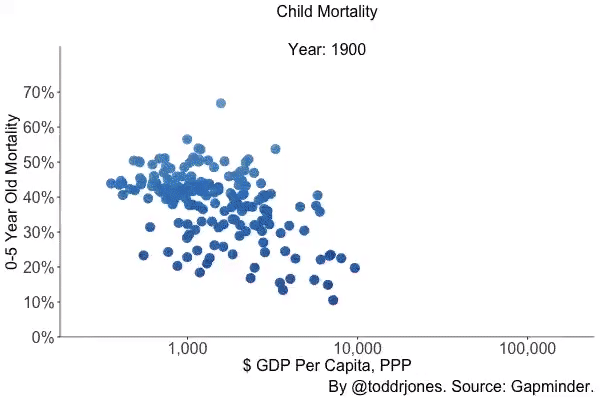lever points | thinkthinkthink #11
on small actions leading to outsized consequences
“Give me a place to stand and with a lever I will move the whole world.” - Archimedes
Stanislaw Ulam points out how it is odd that there is a specific area of science devoted to nonlinear systems; he claims that it is like "referring to the bulk of zoology as the study of non-elephant animals." In truth most systems that surround us are inherently nonlinear and complex; some are simpler, allowing us to partially manage them, but most elude understanding, let alone control. Linear systems are the exception, rather than the rule.
In complex systems small actions can have disproportionally large ramifications. We have previously explored how feedback loops and boundaries - through a bout of luck, a random mutation, or a physical border - can bring about fantastic changes in evolutionary biology or physics. In social systems, while more opaque, lever points can be just as crucial. Glaeser illustrates¹ how a handful of criminals can bring down the social norms in urban settings. Criminal peers are the proof of concept, they provide an example of what is possible, how rules might be broken. That's how gangs are born and can than easily propagate and iterate throughout an urban system. Cities ultimately enhance the impact of individuals.
Broken window theory - in essence - addresses how Zimbardo's sledgehammered car subconsciously "gave permission" to passerby's to join in the destruction. The fact that a window is broken makes us think less of the other windows. The whole isn't perceived as immaculate anymore. The friction on throwing an extra rock at a window and joining in the fun, is much lower than committing the guilt-ridden act of casting the first stone. Despite the theory's political and practical failures, the fact that our moral behavior responds directly to context is hard to argue against.
Sometimes an intended action does not behave as expected. Urban mobility is not the only counterintuitive system in cities. Wikipedia lists loads of interesting examples of what sociologist Robert Merton termed the Law of Unintended Consequences. One of the most interesting examples that comes to mind is Dubner and Levitt's theory on New York's crime decline in the 1990s. From their perspective crime was not brought down by Giuliani's zero-tolerance policy (a disproven perversion of the broken window theory). The writers of Freakonomics argue that Row vs. Wade - the seminal decision on abortion by the US Supreme Court in 1973 - created a demographic domino effect; pregnancies could now be legally terminated, which resulted in less unwanted 16-17 year old in the 1990s, and therefore less crime. Dubner addressed the barrage of criticism and expanded on this theory on his podcast last year. Of course this is oversimplified - the exact opposite of complex - but it illustrates the myriad of possible consequences that relatively small actions can have on interdependent systems.
One important lever point we can't stop talking about these days are vaccines. A literal prick that brings about long-term protection for our individual bodies & herd immunity for the human social-organism. To date however most lever points can only be identified bottom-up through trial and error and do not have universal application; on the contrary they are highly context-dependent. In cities, transformation through urban acupuncture in the past decade seems to have had a much higher signal-to-noise ratio and quality of life impact than any comprehensive planning effort. Tactical interventions can be interpreted as bottom-up efforts to identify a family of "urban vaccines" that can improve the way cities work. These experimental projects increase the diversity and resilience of urban systems; simultaneously their small-scale is a hedge against any negative impact, de-risking the effect the intervention may have on a city. There's often a dissonant discussion of scaling up these interventions - which would actually risk transforming them in exactly the kind of efforts they attempt to counteract. Pilot projects are misnamed. They should not be testbeds of scale, but rather they should solve a specific problem in a specific context at a specific point in time.
For Jacobs, the city as a social organism is a living structure that is constantly changing and springing surprises. Its interconnections are so complex and dimly understood that planning always risks unknowingly cutting into its living tissue, thereby damaging or killing vital social processes. - James Scott
The lack of resilience in a system that is overly connected can also make lever points drivers of systemic risk. They can have outsized negative effects. Such interdependence in financial markets for example might be the cause of financial crises, with small, seemingly innocuous events avalanching into full blown disasters. Similarly air travel volume - and its corollary interconnectedness - is a key factor in increasing the spread of epidemics because of the outsized risk posed by an infected traveler. The wrong domino, at the wrong place can bring down the whole system.
¹ Triumph of the City - Edward L. Glaeser - Kindle Location 1870-1876
Did you like this issue of thinkthinkthink? Consider sharing it with your network:
One Book
A Crude look at the Whole by John H. Miller
John Miller gives a comprehensive and very readable account of complex systems. He provides an easily digestible general understanding of topics as varied as: emergence, feedback loops, heterogeneity, rugged terrain search, intelligence, distributed decision-making, scales of abstraction, networks, power law scaling, cooperation in game theory, and self-organized criticality. I think it's a rare book, in that it manages to compress hundreds of fantastic concepts and ideas in less than 300 pages. For the urban aficionados, social-system examples are peppered throughout. Highly recommended as a great primer (or a good review) on the operating elements of complex systems.
Three Links
How to Punctuate with Style: Lewis Thomas’s Charming Meditation on the Subtleties of Language by Maria Popova
An ode to punctuation.
NuScale’s small nuclear reactor is first to get US safety approval by Scott Johnson
As close to nuclear-as-a-service as it gets.
How Property Booms Eat Our Economic Future by Mike Bird
On the possible resource misallocation caused by real-estate booms.
Five Tweets
This was the eleventh issue of thinkthinkthink - a periodic newsletter by Joni Baboci on cities, science and complexity. If you liked it why not subscribe?
Thanks for reading; don't hesitate to reach out at dbaboci@gmail.com or @dbaboci. Have a question or want to add something to the discussion?










